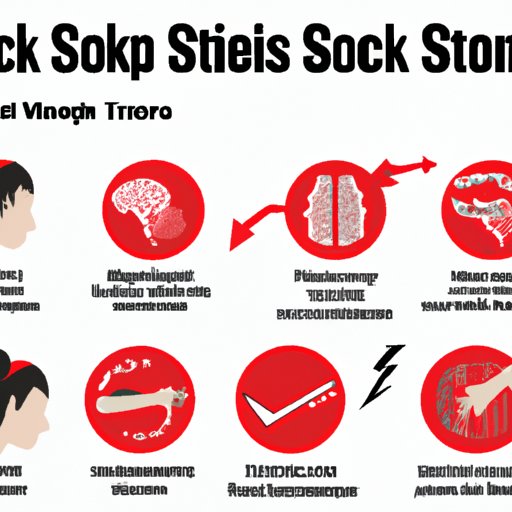Introduction
Mini strokes, also known as transient ischemic attacks (TIA), are sudden and temporary disturbances in blood flow to the brain that cause stroke-like symptoms. Although mini strokes may not cause long-term damage, they are serious warning signs of potential future strokes. This article will explore the symptoms of a mini stroke, why it is crucial to recognize them, and what steps to take for a fast and effective recovery.

Mini Stroke 101: Understanding the Symptoms and Warning Signs
A mini stroke occurs when there is a temporary disruption of blood flow to the brain, usually caused by a blood clot or narrowed blood vessels. Symptoms mimic those of a full stroke, which include sudden weakness, numbness, confusion, slurred speech, dizziness, and vision problems. Mini strokes, however, cause these symptoms only temporarily, often just a few minutes or up to an hour, as blood flow is restored to the affected area. It is important to seek medical attention right away as mini strokes can increase the risk of a more severe stroke later on.
Don’t Ignore These Symptoms: How to Recognize a Mini Stroke
Recognizing the symptoms of a mini stroke can make all the difference in preventing long-term damage. Common symptoms include sudden onset of weakness or numbness on one side of the body, difficulty speaking or understanding speech, sudden loss of vision, dizziness, and sudden severe headaches. It’s important to note that men and women may experience different symptoms, with women more likely to experience nausea, hiccups, and shortness of breath. Additionally, subtle changes in the body, such as difficulty swallowing or unexplained falls, may also be warning signs of a mini stroke.
A Silent Killer: Uncovering the Warning Signs of a Mini Stroke
Mini strokes can sometimes go unnoticed due to their temporary nature, but they can leave permanent damage if ignored. Warning signs such as sudden confusion, trouble walking, or difficulty understanding speech should not be taken lightly. Other warning signs may be subtler, such as feeling lightheaded or suddenly forgetting names or places. These warning signs should never be ignored, and immediate medical attention should be sought.
The Importance of Knowing Mini Stroke Symptoms and What to Do
Knowing the symptoms of a mini stroke is crucial for taking immediate action to prevent future strokes. If someone experiences any symptoms, it is important to call 911 or emergency services right away. It is also important to remember that mini strokes are a warning sign, and medical professionals can help assess the risk of future strokes and recommend preventative measures such as lifestyle changes, medication, or surgery.
Be Aware of Mini Stroke Symptoms: How to Spot Them Early On
Early detection of mini strokes is critical for minimizing damage and preventing future strokes. Symptoms such as sudden difficulty speaking, confusion, and even temporary loss of consciousness should be taken seriously. Seeking medical attention promptly can make all the difference in recovery and preventing further damage. It is important to stay informed and to never ignore subtle changes in the body.
Recognizing Mini Stroke Symptoms: What You Need to Know
There are many misconceptions surrounding mini stroke symptoms, which can cause people to ignore warning signs or delay seeking medical attention. Contrary to popular belief, mini strokes can cause permanent damage and increase stroke risk if not addressed. Knowing the common symptoms of a mini stroke and seeking appropriate medical attention for any warning signs can lead to a faster and more effective recovery.
Stay Alert: The Common Signs and Symptoms of a Mini Stroke
Stay alert and pay attention to changes in your body. If you experience sudden weakness or numbness, difficulty speaking or understanding speech, sudden loss of vision, dizziness, sudden severe headaches or any other unusual symptoms, don’t ignore them. Seeking medical attention is important, and even if the symptoms are temporary, they could be indicative of a more severe potential stroke in the future. Be proactive in reducing your risk of mini strokes by making healthy lifestyle changes and consulting with a medical professional.
Conclusion
Recognizing the symptoms of a mini stroke is critical for ensuring prompt medical attention and preventing future strokes. Early detection and appropriate treatment can make all the difference in recovery and reducing the risk of permanent damage or future strokes. By staying informed, paying attention to subtle changes in the body, and seeking medical attention promptly, we can take proactive measures to reduce the risk of mini strokes and enjoy a healthier life.
